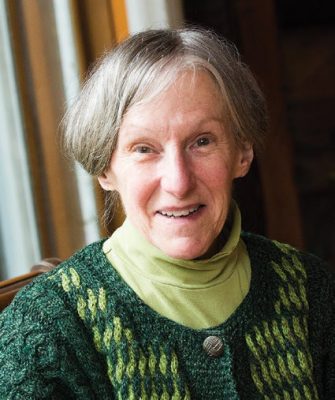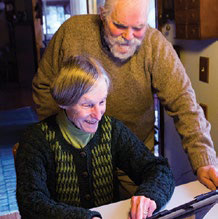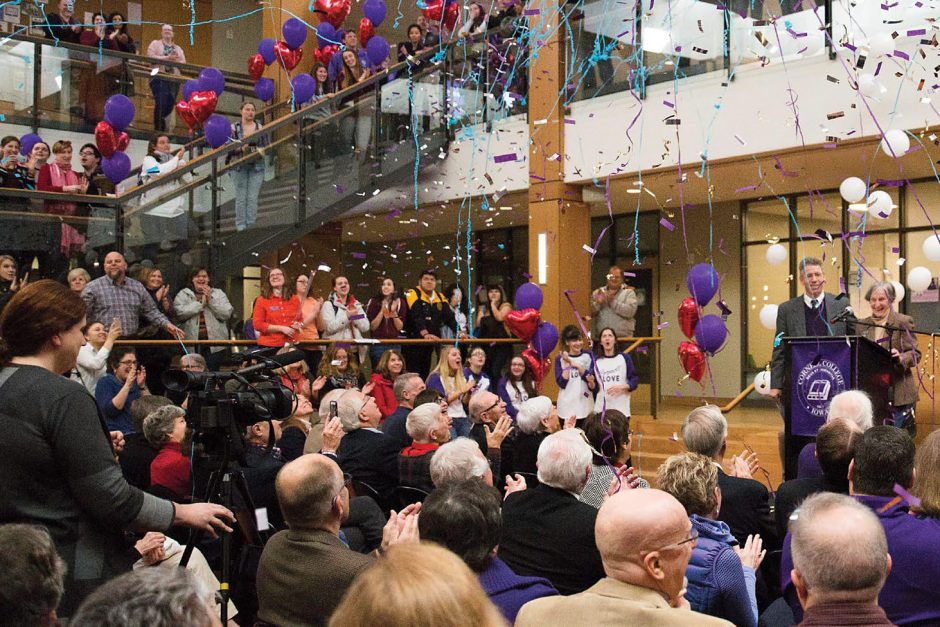Scientist provides critical funding for new facility
As a child, Jean Russell ’65 enjoyed engineering things with her brother’s Lincoln Logs and erector sets. In school she gravitated to the sciences. And in her career she helped make important discoveries about bone disease. She likes the challenges science presents.
“As a kid I played with chemistry sets and doctors’ stethoscopes. Nobody in our family was into science, but I became interested in science,” she says. “It was problem-solving, it was always changing, and it was very dynamic. That attracted me.” 
Russell credits her Cornell College education with having provided the groundwork for her to thrive in the scientific field. As she became more involved with her alma mater in recent years, however, she noticed that while Cornell’s science faculty have kept pace with the changes in how science is taught, they have been hampered by an outdated facility.
“Science and technology have always been at the forefront of education. Today, as when I went to Cornell, there are many students interested in the sciences. A new science facility is really the next critical step for Cornell. It is necessary to complement the full range of our liberal arts education,” Russell says. “And without the science upgrades, Cornell would remain several steps behind other schools and couldn’t really seek to be as competitive, let alone more competitive.”
Now Russell is making it possible for Cornell to leap ahead in the sciences with a remarkable $20 million gift toward the college’s $35 million STEM (science, technology, engineering, and math) project. The result will be the first free-standing academic building on the Hilltop in over 40 years, Russell Science Center, as well as renovations to West and portions of Law halls.
With her gift, Russell says, she is providing Cornell faculty and students greater tools and opportunities to thrive and, ultimately, helping Cornell achieve comprehensive growth.
An affinity for science
Russell developed an interest in science during junior high, and sated her appetite for knowledge with advanced placement chemistry courses at Maine Township High School in Park Ridge, Illinois. When it came time for college, Russell became focused on biology with the goal of pursuing graduate or medical school. She didn’t see a point in traveling to college on one of the coasts when there were good schools in the Midwest. Having gone to a large high school, she decided she wanted a change. On her own she took the train to visit several small colleges.
Going to college
“What sold me on Cornell was the weekend I spent there,” she recalls. “I stayed with some kids, and they took me to various activities on campus and showed me around. It was just something about the atmosphere, about the sense of community at the college, that really drew me to it.”
Like many before her, at Cornell Russell experienced self-discovery in liberal arts study. She especially remembers developing an appreciation for history in a class taught by the legendary professor Eric Kollman. “Memorizing kings and wars and dates was no problem, but it was dry and uninteresting,” she recalls. “This was the first time I had any history course that went into geography, economics, religious tenor, and boundaries like Russia’s march to a warm-water port—which explained so much about why they wanted to conquer here and go there. It was the first time I had history explained in terms of any dynamics.”
Russell majored in biology, minored in chemistry, and earned a teaching certificate as a backup option. She completed and defended a senior honors project on temperature regulation in chickens, a precursor of her future career that included discoveries centering on the cardiovascular system and endocrinology. When her advisor, Biology Professor Ed Rogers ’39, took sabbatical her senior year, Professor Bob Toft stepped in and helped lead Russell to her next phase in life. Toft had worked with an endocrinologist at Rice University in Houston, Texas, and he suggested that Russell look into their graduate program. By fall of 1970 she had completed her Ph.D. at Rice in the biology department, with a specialty in endocrinology.
A research career
Russell spent the next 25 years at Washington University Medical Center. She began as a postdoctoral fellow in endocrinology, became a researcher and assistant professor of endocrinology, and finished as an associate professor of orthopedic surgery, overseeing that division’s research lab.
Her team did important work defining the nature of bone disease in renal failure, changing the approach to its treatment. They collaborated with Procter & Gamble on developing Actonel, now a widely used osteoporosis prevention drug. In the 1980s she was also co-investigator on research concerning the effects of space travel on bone and tooth development.
During her career she published more than three dozen articles and received research grants from the National Institutes of Health, the Arthritis Foundation, NASA, the Public Health Service, and the Shriner’s Hospital.

Jean and Bob
Two years after she arrived in St. Louis, Russell met Bob Childers through a cycling club. They were married two years later in 1975.
“You have no idea how proud I am of her. Her knowledge blows me away,” says Childers of his wife, whom he lovingly calls “the boss.” A Cornell honorary alumnus, Childers accompanies Russell when she travels to Cornell Board of Trustee meetings and supports her leadership and generosity.
In St. Louis Childers owned and operated printing presses and worked for the Military Personnel Records Center. The couple left city life in 1994 to live in Pentwater, Michigan, a year after discovering the area during a bicycle tour. After more than 20 years there they’ve become community fixtures, originally as owners of a local convenience store, and now through the leadership and support they provide on numerous boards and foundations. Childers is also known as an award-winning painter and woodcarver who shows his work at Midwestern art fairs and festivals.
The couple lives in a cabin-style home on six wooded acres near Lake Michigan, where Childers always welcomes his Cornell College guests with a hug and an offer of coffee. Books, family memorabilia, collections, and some of Childers’ artwork and woodwork line the walls, tables, and shelves. Among the family photos is a prominent portrait of Russell’s father, James Russell, when he was chief financial officer of Illinois Tool Works.
A leader on the board
Russell approached Cornell after her father left her an estate gift in 2011, prompting a $5.6 million gift for renovations of the Thomas Commons and an endowed scholarship. Russell says her father, a first-generation American, believed strongly in the importance of higher education.
Through James Russell’s legacy gift she became more closely involved with the college and was elected to the Board of Trustees in 2012. She says she’s found the experience of being a trustee “very rewarding” and understands clearly the college’s aspirations and challenges. Russell says she also has made good friends and reconnected with people like Trustee Bob McLennan ’65, her classmate at Maine Township High School and Cornell.
McLennan was delighted to welcome Russell back to campus. “I have a long history with Jean. Jean has always been smart, studious, and inquisitive,” he says. “She has always brought energy and focus to whatever she did. I’m proud to know someone who has done so much for Cornell.”
Russell joins Richard Small ’50 and honorary alumna and trustee Norma Thomas Small as the most generous benefactors in Cornell history. They were thrilled to learn of her leadership gift to the sciences.
“We are overwhelmed with Jean’s very generous gift, which will make possible this wonderful science facility for future Cornell students and help grow our enrollment,” they wrote in an email.
Furthering her father’s vision
All of the Science Facilities Project funding will come from philanthropy by Trustees, alumni, friends, and foundations. Another $3 million remains to be raised of the $35 million total project cost.
“I feel like I’m able to give to the college something it can really use and grow with at an important time in its life,” Russell says. “Now the Trustees at Cornell hope alumni, regardless of their major at Cornell, will see fit to invest in completing the science project, for the sake of Cornell and its continuing growth. With this building we’re going to be in a much better position for recruitment of faculty, and recruitment of students.”
With her gift and her leadership Russell has not only honored her family legacy, she has earned a place in Cornell history—as someone who built on her Cornell education to make scientific discoveries, and as someone whose transformative gift will lead to future discoveries by future generations.

